What does it take to be a professor? That is exactly the type of question the McNair Scholars Program wants students to ask early on in their undergraduate years. The national program prepares talented students who are first-generation and low-income, or from other underrepresented groups, for doctoral study. Over 200 McNair Scholars from UMBC and other universities across the nation recently gathered at UMBC for a McNair Scholars National Research Conference to share their work and connect with faculty mentors and each other.
The McNair Scholars Program was created in memory of Ronald E. McNair, physicist and NASA astronaut who lost his life on the Challenger mission. UMBC has carried on McNair’s legacy for 26 years through a highly active McNair Scholars chapter. Over 300 UMBC students have tapped into the academic, social, professional, and personal support the national program offers via workshops, trainings, conferences, and networking events. Students traditionally enter the program their junior year, but applicants are welcome to apply earlier so they can benefit even more.
The conference experience
As a first-time conference participant, Luwan Gebreyesus ‘19, health administration and policy, was in awe of the diversity of research and thought among her peers. “I joined my junior year and I wish I knew about the program earlier. I always knew that I would pursue a doctorate degree,” says Gebreyesus, who studies trauma and sound. “McNair has been a catalyst for opening my eyes to how much preparation goes into getting ready for a Ph.D program, connecting me to resources, and developing in me the agency to embrace being ambitious and successful.”
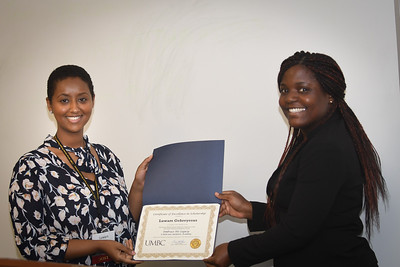 Gebreyesus accepting a certificate from Margaret Kessie ’22, M.A., teaching English as a second language.
Gebreyesus accepting a certificate from Margaret Kessie ’22, M.A., teaching English as a second language.
While the conference is a platform for UMBC student scholars to share their own research, it also offers them important opportunities to gain skills organizing and hosting an academic conference. Networking is also a fundamental part of the experience. Students value the opportunity to connect with peers with similar backgrounds, and also practice the skills involved in building professional relationships.
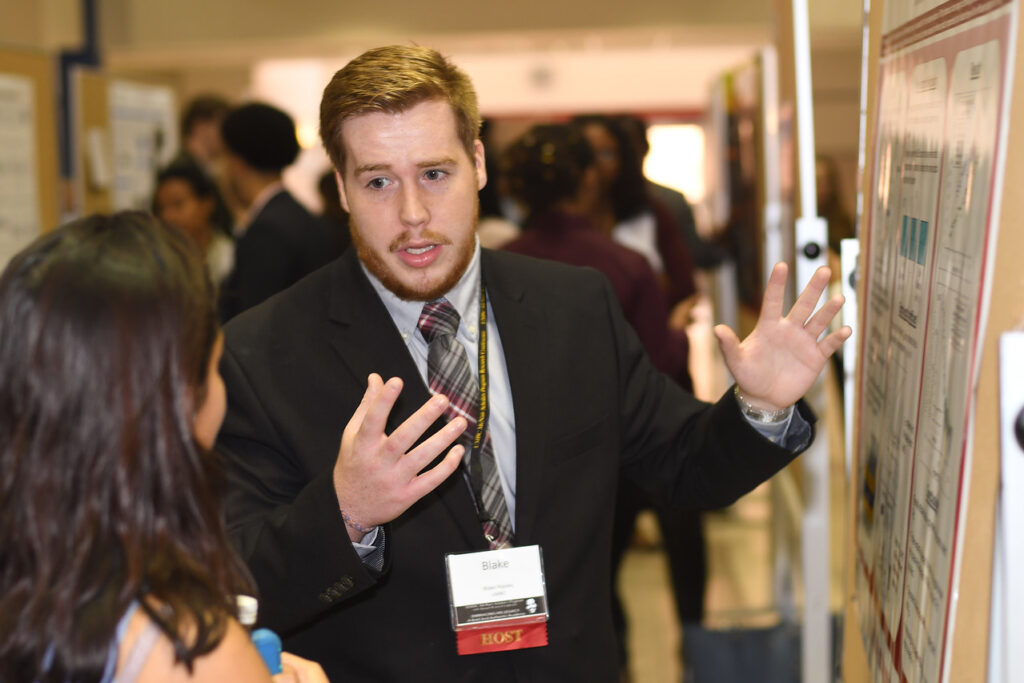 Blake Hipsley presenting a poster on new ideas for imaging frequencies.
Blake Hipsley presenting a poster on new ideas for imaging frequencies.
Blake Hipsley ‘19, physics and math, presented a poster on his research on different materials that can maximize imaging frequencies in fields like medicine. “Neither one of my parents earned a college degree. I didn’t have anyone I could relate to tell me how to get into graduate school,” says Hipsley. “McNair helped me access a network of people to help me develop research skills and manage the graduate school application process. Now I tutor other students in math to help them with their graduate school entrance exams.”
The impact of mentors
Mentorship is crucial to the success of McNair Scholars. Faculty, staff, and alumni can become McNair Mentors or Faculty Research Mentors, to support students as they navigate the graduate school preparation process.
Maria Sanchez, Mechanical Engineering, and Director of Education and Outreach for the College of Engineering and Information Technology, was drawn to the McNair mission and offered inspiring words for the attendees as the keynote speaker. “As a woman in mechanical engineering, I always struggled with feeling out of place,” Sanchez reflected. “After I came to the United States to attend graduate school and became part of another underrepresented group, I understood that I have a responsibility to other women and Hispanics that are trying to do the same.”
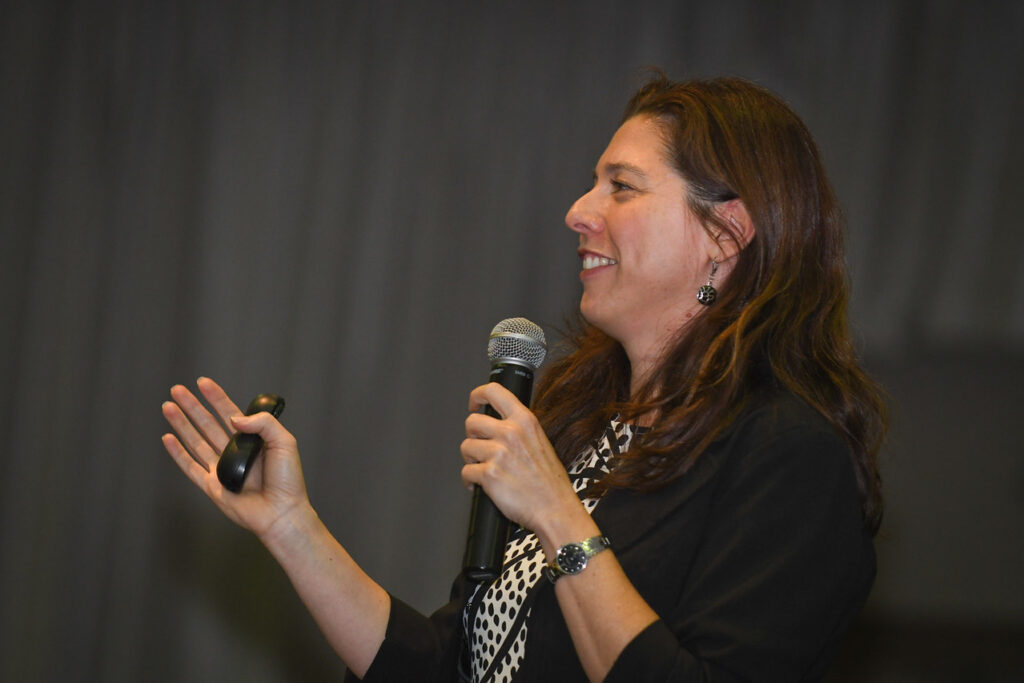 Keynote speaker Maria Sanchez sharing inspiring words with McNair Scholars.
Keynote speaker Maria Sanchez sharing inspiring words with McNair Scholars.
Sanchez sees a direct link between faculty sharing their journeys and students feeling like they are not alone in a challenging yet rewarding path. “I know now that we need to embrace the differences that we bring and recognize them as assets and advantages,” she shared with the group. “I hope that by participating in events such as the McNair conference, I could give strength to those that are struggling in the same way that I did.”
The conference also offered an opportunity for faculty who were themselves McNair Scholars as undergraduates to share their journeys with today’s students. UMBC’s Earl Brooks, assistant professor of English, and Christine Hawn, assistant professor of geography and environmental systems, moderated a conference panel. “The McNair program was critical for me, and it was awesome to experience being on the other side of things as a faculty member,” said Brooks. “The conference is such a great opportunity for students to gain the experiences of presenting their research.”
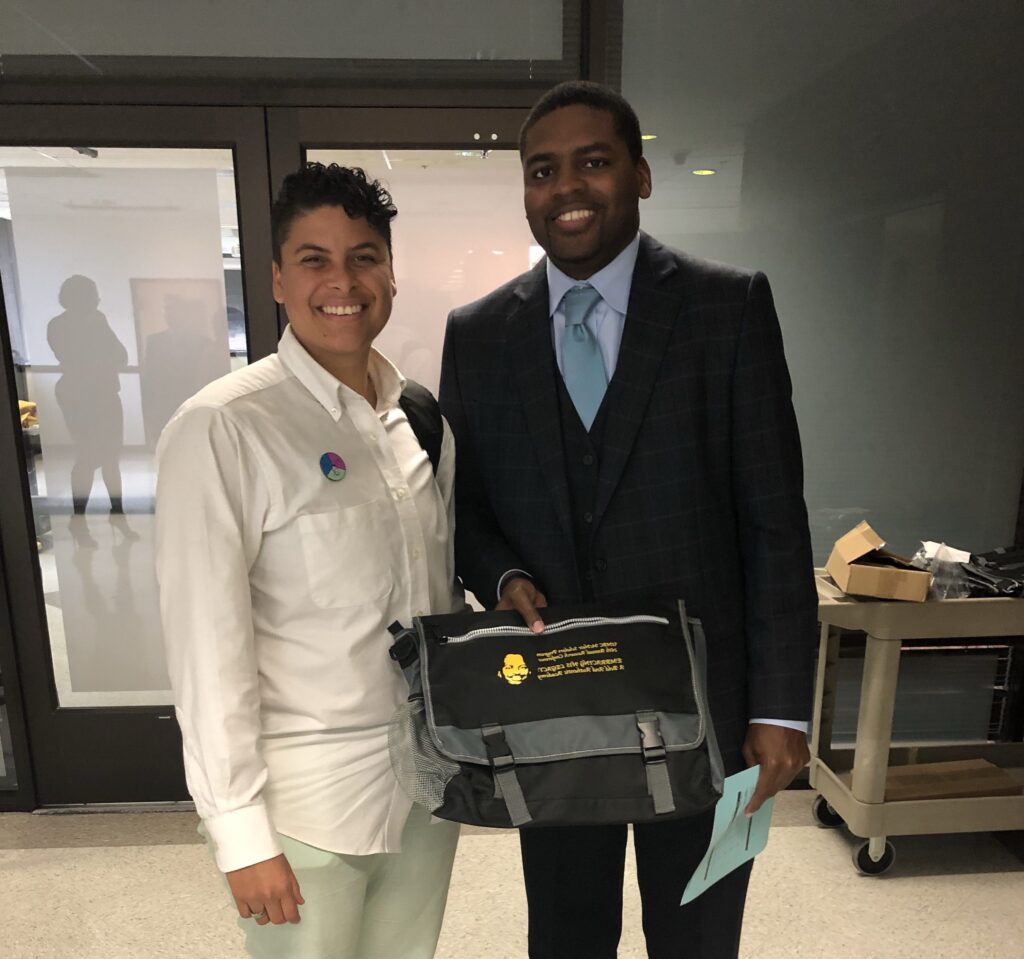 Christine Hawn and Earl Brooks, who are both McNair alumni and UMBC faculty.
Christine Hawn and Earl Brooks, who are both McNair alumni and UMBC faculty.
Participating students also spoke to the profound impact that mentorship can have. Damarius Johnson ‘19, Africana studies, transferred to UMBC from the Community College of Baltimore County Essex, where he learned about the McNair Scholars and about UMBC as a place to help him prepare for his Ph.D. aspirations.
“I would not have been able to come to UMBC and be in this program if not for the fact that I had mentors who made it possible for me,” said Johnson. “If I can do that for other people that would be a very powerful thing because I am the first in my family to get a college education. The mentors have helped me see that my dreams are possible.”
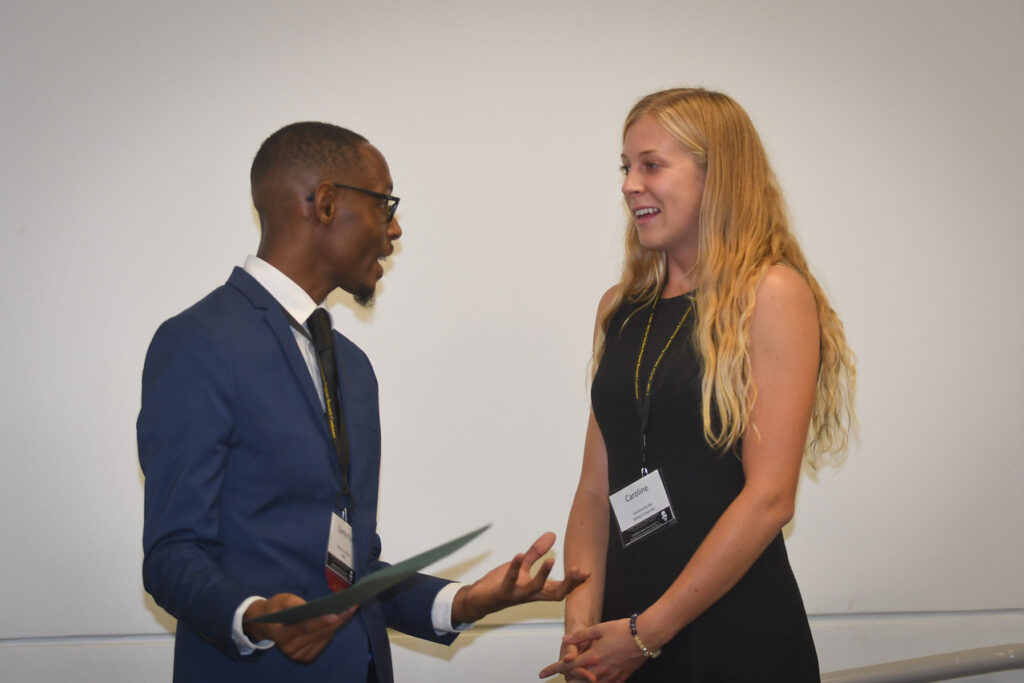 Damarius Johnson networking with another scholar.
Damarius Johnson networking with another scholar.
Future scholars
As assistant director of the McNair Scholars Program at UMBC, Michael Hunt ‘06, mathematics, Ph.D. ‘25, language literacy and culture, sees the program’s impact both in the opportunities it creates for students and in the value of scholarship those students produce. “McNair scholars are doing important work in math, science, the humanities, and the arts,” he notes.
Hunt hopes to continue to grow the program and is working to connect with eligible students as early as possible in their UMBC careers. He emphasizes, “There should not be any student that limits their aspirations because they are unsure how to pursue a Ph.D. or because of financial constraints.”
Current and prospective UMBC students can learn more about the McNair Scholars Program by completing this brief interest form at any time. The application window is December 1 – February 8. Faculty and staff interested in mentoring can contact program staff at any time through the McNair Scholars website.
All photos by Eric Stocklin.